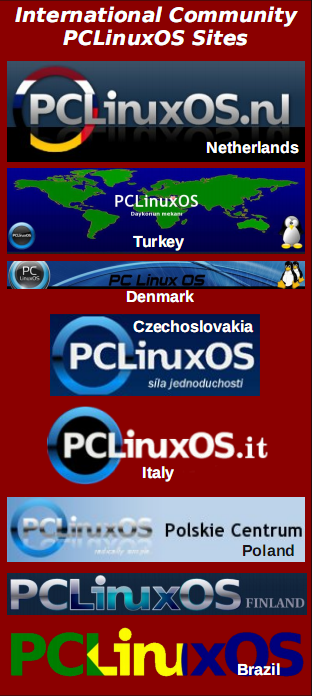| Previous
Page |
PCLinuxOS
Magazine |
PCLinuxOS |
Article List |
Disclaimer |
Next Page |
OpenVPN: Other VPN Services
|
|
by Paul Arnote (parnote) Previously in this issue of The PCLinuxOS Magazine (and in the PCLinuxOS forum), Texstar wrote about using OpenVPN (installable from Synaptic) with VPNBook, a free VPN (Virtual Private Network). However, since Texstar's original post in the forum, some information has surfaced that may cause users to view the free VPN service suspiciously. User Beware! VPNBook has been accused by Anonymous hacktivists of turning over log files relating to the activities of Anonymous members to the authorities. Here is the complete post (text and graphic) from Anonymous's Google+ stream on January 20, 2013. The graphic has been edited to blur out items that may be offensive to some readers. If you want to view the unedited graphic, then visit the previous link to the actual Google+ post. Logs from vpnbook.com and voxility.com have appeared in the court discoveries and indictments of some Anons facing prosecution for their involvement in #Anonymous activities. Do not use these services. Be advised and please share.  If you have no "illegal" or "suspicious" activities to hide, then VPNBook may serve your needs just fine. But if the Anonymous charges are true, the log files of your specific online activity are freely available to the authorities "for the asking." Such actions defeat the major purpose of connecting to the internet by a VPN. Here's how the Pete Zaborszky put it on his website, Best VPN, in his article on this situation: While we have no idea whether this accusation is true, the VPN service run by Romanian Infrastructure firm Voxility does appear to offer a suspiciously feature-full package given that it charges nothing, while boasting of high speeds, OpenVPN and PPTP protocols with 128-bit or 256-bit AES encryption, no bandwidth limits, no restrictions on what the service can be used for (i.e. P2P), and that logs are discarded every week (and that only the IP address and time the connection is made are logged, not users' activities). VPNBook says the service is supported through advertising, but it does seem surprising that they can offer two servers in Europe, and server each in the UK and US using OpenVPN encryption on this model. Of course, if the accusation is not true (or it doesn't worry you), then all these features on offer for free may make VPNBook worth checking out... VPNBook does advertise that they do not maintain logs of your activity while connected to the internet via their VPN (visit their website via the link in the Anonymous quote above to see for yourself). However, Zaborszky presents a very valid point in his response. How can such a full featured package that boasts high speeds, OpenVPN and PPTP protocols, 128-bit and 256-bit AES, no bandwidth limits, no usage restrictions, and logs that are discarded every week ... be offered for free, via no less than four dedicated servers, using an advertising supported service? You Get What You Pay For That old adage "you get what you pay for" seems to really hold true when it comes to selecting a Virtual Private Network provider. Fortunately, the Best VPN website offers not only reviews of VPNs, but it also provides lists of the best OpenVPN compatible VPN providers. Almost all of the alternative VPNs are fee-based services. The prices tend to range from around $4 per month (U.S. currency), to around $20 per month. Some VPN providers offer the ability to pay for up to a year at a time, usually with significant savings over paying for the service on a monthly pay-as-you-go basis. For example, HideMyAss.com, one of the top ranked VPN providers, was running a special when I was writing this article. Under that "special," the monthly pay-as-you-go service cost $9.99, but paying for an entire year cost $59.99. By paying for an entire year of service up front, that brings the cost down to $4.99 per month (amortized out over the entire year). Why Use A Virtual Private Network? If you're still not convinced of the value of using a VPN, let's take a look at the benefits. Hardly anyone on the face of this planet hasn't heard of the NSA's snooping, not only on foreign nationals, but also on American citizens. Many of us have used open, insecure public WiFi hotspots. Most of us are becoming increasingly aware and wary of the mining of our personal data on the internet. Use of a VPN remedies those problems. Increase your online security. Using a VPN encrypts your internet traffic, and prevents eavesdroppers and hackers from easily intercepting your online data. This is especially useful for those times when you are using an open, free, public WiFi hotspot. Works with all internet applications. Unlike a web proxy, which only protects content fed through your web browser, a VPN remains active for all of your internet applications. This means that your Pidgin conversations, IRC chats, and every other online activity is protected by tunnelling your internet connection. Virtually reside in another country. By using a VPN, you can change your online identity to make it appear that you reside in another country. This makes it so that users can view content that might typically be restricted to users of a certain country, such as some iBBC content, some YouTube content, programs on Hulu or NetFlix, etc. The application of this feature of a VPN is often enough to justify its use, especially if you live in an area of the world where there are strict internet restrictions. Anonymous internet identity. When you connect to a VPN, your online identity (typically your specific IP address) will be masked behind one of the anonymous IP addresses of the VPN server or provider. Government level security. Most VPNs use the same encryption standards that are used and enjoyed by governments all around the world. Bypass censorship. By using a VPN, you can circumvent censorship, regardless if it's site specific (like at the office), from an internet provider (traffic shaping), or blocked sites (at the office or by a government). Summary So, although the VPNBook provider specified by Texstar in his article may raise some suspicions, there are other VPN providers who are a bit more "secure" with your data and usage logs (if they even keep logs at all ... some providers don't even keep them). Of course, you will have to pay for that security. It all boils down to how secure do you want your data and your browsing habits to be? How much do you want to avoid others being able to scrutinize your internet activities? |


